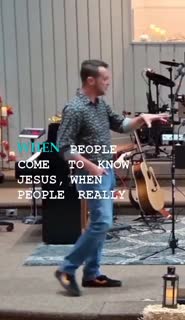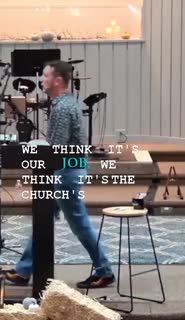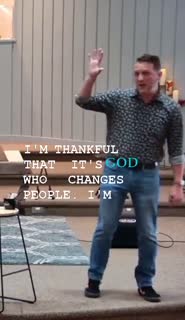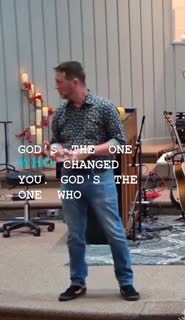God's Transformative Power in Ephesus: A Journey of Faith
Devotional
Sermon Summary
Bible Study Guide
Sermon Clips
1. "Have you ever tried to be the one that forces change in another person, forces God's change, forces spiritual change in another person? Anybody ever done that? Anybody? A couple of hands? Yeah. I mean, if you've been a believer for very long, if you've tried to disciple or help people grow in Christ, you probably have. I remember years ago, I had a conversation with somebody, and I've shared this story before, and I'll continue to share it because it's a real story. I said, you know, I've been working with this guy for like a year, and he's still not getting this. He's not getting this idea. He's not getting this point. It's not growing in this area. What in the world? And so I asked him, I said, how long did it take you to learn that? He said, about 30 years. I said, then why do you expect this guy to get it in one? Because see, sometimes we expect that we're the ones who bring change, and we're not. We are not the ones who bring change in people. Now, God can use us to encourage and strengthen, to disciple, to do all these different things. God can use us, but God's the one who brings the change, not us. God changes people, not you and not me." [37:14] (67 seconds)
2. "When people come to know Jesus, when people really come to know Jesus, when they really believe in Him to save them from their sins, He brings change. We saw that with the people of Ephesus. He brought change. They gave up everything that they were. They turned over everything that was against Him. They burned it. It's not even like, I'm taking this, I'm taking this, I'm taking this to the thrift store for somebody else to buy it and use it. They burned it. I don't want it, and nobody else is going to have it either. They got rid of it. They had drastic change in their lives because God changes us when we come to know Jesus. When people in a city come to know Jesus, the city begins to change." [57:04] (45 seconds)
3. "We think it's our job, we think it's the church's job to go out and change people, to change the community, to change the culture, to change the city, to change the country, to change the world. I'm going to tell you, it's not the church's job. It's not the church's job. Jesus said, I will build my church. It's His job. That whole changing thing, that whole salvation thing, that whole transformative thing, that's the work of God. That's not your work and that's not my work. Now, the work that is ours is to live as Scripture has called us to live, to proclaim the gospel, to tell people about Jesus, to live the greatest commandments, to love the Lord your God. To love your God with your heart, your soul, your mind, your strength, and the second that's like it, to love your neighbor as yourself. That's your job. That's my job. If you know Jesus, that's what our job is. Our job is just to live the way He told us to live." [59:06] (61 seconds)
4. "I'm thankful that it's God who changes people. I'm thankful it's God that's at work. I'm thankful that it's God who is doing this because you know people can stop me and people can stop you. You can go out in Carson City and you can proclaim Jesus and people can stop you. We can go out and tell people about Jesus and we can be put to death for it and we're stopped. We're done. That's it. We're over. Nobody can stop God. Nobody can stand against God. Nobody can stop the change that God brings. Nobody can stop the work that God does. And see, that's where we get mixed up sometimes. We think it's us that has to do this. It's God that has to do this. That really takes a lot of pressure off of us. It really does. What's my responsibility? As a church, what's our responsibility? Live the way He told us to live and tell people about Jesus. That's my responsibility. He brings the change. He does the rest. And nobody can stop Him. Nobody can stand against Him." [01:00:11] (70 seconds)
5. "God's the one who changed you. God's the one who changed me. And He's the only one that's going to change our neighbors. He's the only one that's going to change our friends. He's the only one that's going to change our family. He's the only one that's going to change our co-workers. But we, we have to point people to the only one who can bring change. We have to point people to Jesus. That's what Paul did all through the book of Acts. That's what Paul's going to continue to do as we move towards the end of his life. He's going to point people to Jesus. And that's what we need to do, point people to Jesus." [01:09:09] (36 seconds)
Ask a question about this sermon
2. "When people come to know Jesus, when people really come to know Jesus, when they really believe in Him to save them from their sins, He brings change. We saw that with the people of Ephesus. He brought change. They gave up everything that they were. They turned over everything that was against Him. They burned it. It's not even like, I'm taking this, I'm taking this, I'm taking this to the thrift store for somebody else to buy it and use it. They burned it. I don't want it, and nobody else is going to have it either. They got rid of it. They had drastic change in their lives because God changes us when we come to know Jesus. When people in a city come to know Jesus, the city begins to change." [57:04] (45 seconds)
3. "We think it's our job, we think it's the church's job to go out and change people, to change the community, to change the culture, to change the city, to change the country, to change the world. I'm going to tell you, it's not the church's job. It's not the church's job. Jesus said, I will build my church. It's His job. That whole changing thing, that whole salvation thing, that whole transformative thing, that's the work of God. That's not your work and that's not my work. Now, the work that is ours is to live as Scripture has called us to live, to proclaim the gospel, to tell people about Jesus, to live the greatest commandments, to love the Lord your God. To love your God with your heart, your soul, your mind, your strength, and the second that's like it, to love your neighbor as yourself. That's your job. That's my job. If you know Jesus, that's what our job is. Our job is just to live the way He told us to live." [59:06] (61 seconds)
4. "I'm thankful that it's God who changes people. I'm thankful it's God that's at work. I'm thankful that it's God who is doing this because you know people can stop me and people can stop you. You can go out in Carson City and you can proclaim Jesus and people can stop you. We can go out and tell people about Jesus and we can be put to death for it and we're stopped. We're done. That's it. We're over. Nobody can stop God. Nobody can stand against God. Nobody can stop the change that God brings. Nobody can stop the work that God does. And see, that's where we get mixed up sometimes. We think it's us that has to do this. It's God that has to do this. That really takes a lot of pressure off of us. It really does. What's my responsibility? As a church, what's our responsibility? Live the way He told us to live and tell people about Jesus. That's my responsibility. He brings the change. He does the rest. And nobody can stop Him. Nobody can stand against Him." [01:00:11] (70 seconds)
5. "God's the one who changed you. God's the one who changed me. And He's the only one that's going to change our neighbors. He's the only one that's going to change our friends. He's the only one that's going to change our family. He's the only one that's going to change our co-workers. But we, we have to point people to the only one who can bring change. We have to point people to Jesus. That's what Paul did all through the book of Acts. That's what Paul's going to continue to do as we move towards the end of his life. He's going to point people to Jesus. And that's what we need to do, point people to Jesus." [01:09:09] (36 seconds)





